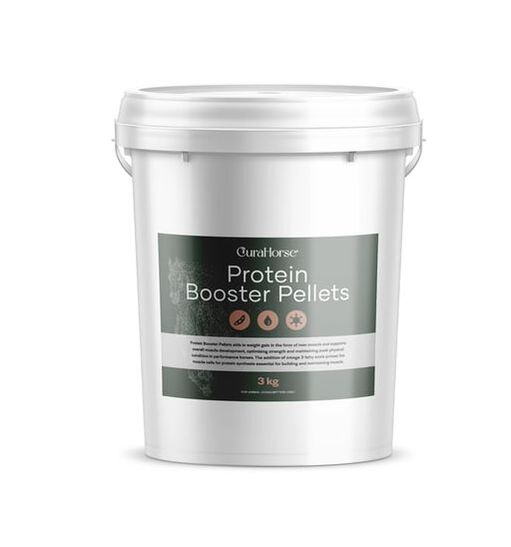|
At Equimotion, we prioritise considering nutritional factors for healing, recovery, and optimal performance in our patients. Sometimes, the best course of action may involve referral to a nutritionist or back to your vet, and we are fortunate to have excellent colleagues in the industry whom we can connect you with.
In many instances, when your horse's diet is adequately meeting their nutritional requirements, a straightforward addition of a protein supplement to their diet can significantly aid in promoting the muscle development necessary for injury recovery or performance enhancement. Protein is a crucial component of musculoskeletal tissue, playing a pivotal role in muscle building and repair, which is why your physiotherapist may recommend its inclusion in your horse's diet. Equimotion proudly recommends EquaCare's CuraHorse® Protein Booster Pellets for our equine clients, a high quality protein supplement that supports muscle development. Receive 10% off with the code: EQUIMOTION10 |
Full disclosure - using the code above is an affiliate link, meaning we get a small commission if you purchase with the discount code - at absolutely no cost to you. Please know we only recommend products we like and have used!
What are CuraHorse® Protein Booster Pellets?
The CuraHorse® Protein Pellets supplement was developed based on:
Ingredient List: Extruded full fat soybean, linseed oil (Omega 3), gamma oryzanol, soy protein concentrate.
Is there any research about feeding protein in horses?
There are some research articles relating to amino acid requirements in horses, specifically the availability from supplementation with soybean meal. Research is still developing in this subject and there is much still to learn, what we do know so far suggests that:
The use of soybean meal and full fat soybean meal by the animal feed industry.
Amino Acid Requirements in Horses
What do we know from the human literature?
A Review on the Optimal Timing of Protein Supplementation on Resistance Training
Protein Supplementation and Athlete Performance
Effects of Protein Supplementation on Performance and Recovery in Resistance and Endurance Training
Skeletal Muscle Disuse Atrophy and the Rehabilitative Role of Protein in Recovery from Musculoskeletal Injury
The CuraHorse® Protein Pellets supplement was developed based on:
- equine amino acid requirements
- the known necessity of dietary protein concentrations as the most important nutrient associated with skeletal muscle growth in animals
- the effects of gamma oryzanol and flaxseed (linseed) on reducing muscle damage and inflammation post exercise, to further assist in muscle building from protein synthesis.
Ingredient List: Extruded full fat soybean, linseed oil (Omega 3), gamma oryzanol, soy protein concentrate.
Is there any research about feeding protein in horses?
There are some research articles relating to amino acid requirements in horses, specifically the availability from supplementation with soybean meal. Research is still developing in this subject and there is much still to learn, what we do know so far suggests that:
- Protein in soybean meal is almost completely digested in the equine digestive tract, suggesting that it is an effective protein source for horses. (Farley et al)
- The amount of protein horses consume directly influences how effectively their muscles grow. Loos et al found that when mature, sedentary horses eat a moderate amount of high-quality protein, it triggers their muscle-building pathways to operate nearly optimally.
- Mowry et al examined the effects of feeding young horses rice bran oil and flaxseed oil, which contain omega-3 fatty acids, on inflammation and muscle damage after exercise. They found that including these oils in the horses' diet for 60 days reduced the increase in certain markers of inflammation and muscle damage compared to horses not receiving the oils.
The use of soybean meal and full fat soybean meal by the animal feed industry.
Amino Acid Requirements in Horses
What do we know from the human literature?
- Daily protein intake is crucial in facilitating positive adaptations to exercise.
- Consuming protein in the post-training period (1hr or less) plays a potentially useful role in optimising physical performance and positively influencing the recovery process.
- While the application of protein-based strategies in disuse periods after injury is still limited, evidence suggests potential benefits, particularly in orthopeadic surgery recovery. Further research is needed to explore the effectiveness of protein interventions across various injury types and age groups.
A Review on the Optimal Timing of Protein Supplementation on Resistance Training
Protein Supplementation and Athlete Performance
Effects of Protein Supplementation on Performance and Recovery in Resistance and Endurance Training
Skeletal Muscle Disuse Atrophy and the Rehabilitative Role of Protein in Recovery from Musculoskeletal Injury

